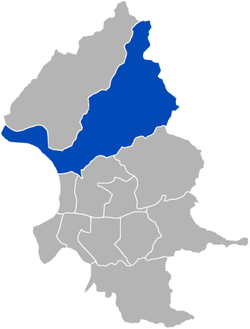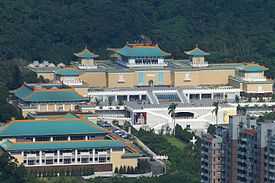Shilin District
| Shilin District 士林區 Pattsiran | |
|---|---|
 | |
 | |
| Country | Taiwan |
| Region | Northern Taipei |
| Divisions |
List
|
| Area | |
| • Total | 62.3682 km2 (24.0805 sq mi) |
| Area rank | Ranked 1st of 12 |
| Population | |
| • Total | 283,280 (April 2,010) |
| • Rank | Ranked 2nd of 12 |
| Postal code | 111 |
- For the rock formations in Yunnan, see Shilin (Stone Forest).
Shilin District (Chinese: 士林區; pinyin: Shìlín Qū) is a district of Taipei. The name "Shilin" was derived from Pattsiran, the Ketagalan word for "hot springs". It was then transliterated into Chinese as "八芝蘭" Bāzhīlán, and finally re-analyzed as "scholars as many as the trees in the woods" (士多如林).
History
Shilin is foremost a residential district and has several famous neighborhoods, such as Waishuangxi (外雙溪) and Tianmu. Kuomintang leader Chiang Kai-Shek lived in Shilin after moving the Chinese Nationalist government to Taiwan after the Chinese Civil War. The district is divided up into 51 villages (里), which are further divided up into 987 villages (鄰).
The district can be said to be the origin of culture in Taipei.[1] During the Qing Dynasty, many private, public and community schools were opened in the area. During Japanese rule, a national learning center was set up at Zhishanyan.[1]
Overview
Shilin is home to a large foreign population, mainly concentrated in the Tianmu area. It has long been a top choice for expatriates from Europe, the United States, and Japan to live, run businesses, and establish embassies and offices[1] due mainly to the natural environment--sitting at the feet of Taipei's Mt. Yang Ming--and because the international schools are all located here. The central command of the Republic of China Navy is located in Shilin.
Education
Shilin has three universities: Ming Chuan University, Soochow University, and the Chinese Culture University. Several international schools, including the Taipei American School, Taipei Japanese School, and Taipei European School are located in this district. The district is also home to two vocational colleges, four senior high schools, eight junior high schools, and twenty elementary schools.[1]
The National Taiwan Science Education Center also is located in this district, along with the Taipei Astronomical Museum, the Shung Ye Museum of Formosan Aborigines, and the world-renowned National Palace Museum.
Tourism

Tourist attractions include the Yangmingshan National Park, National Palace Museum, Taipei Astronomical Museum, National Science Taiwan Education Center, Hwa Kang Museum, Chiang Kai-shek's Shilin Official Residence and Shilin Night Market. The Tatun Volcano Group is located northeast of the district.
The district is home to many national historical sites, including historical temples, markets, and buildings. It is also the location of the Tianmu Baseball Stadium, Bailing Sport Park, Shilin Fitness Center and Chinese Culture and Movie Center. The Shuangxi Park and Chinese Garden is also located in Shilin.
Shopping
The two main commercial areas in the district are the Tien-mu Commercial Circle and the Shilin Night Market.[1] The Tien-mu Commercial Circle was home to many high-ranking officials after the Chinese Civil War and developed into a high-class residential district.
Shilin Night Market is perhaps the largest and most well-known night market in Taiwan; it is accessible from the Taipei Metro Jiantan Station.
Transportation
In addition to many bus lines, the district is served by the Taipei Metro Tamsui Line. It is served by Provincial Highway No. 2 and many other main roads through the city.
Sister cities
 Los Altos, California, USA
Los Altos, California, USA Walnut, California, USA
Walnut, California, USA
References
External links
| ||||||||||||||||||||
Coordinates: 25°05′00″N 121°31′01″E / 25.0833°N 121.517°E


.svg.png)